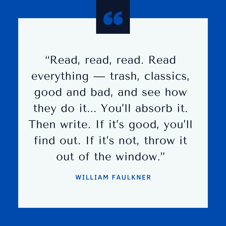Why “I’m Not a Writer” Probably Isn’t True
 “I’m not a writer.” If I had a dollar for every time someone said this to me, I could buy three or four deluxe burritos.
“I’m not a writer.” If I had a dollar for every time someone said this to me, I could buy three or four deluxe burritos.
Sure, some people have a knack for writing. Other people write like a screeching violin, from whom we want to hide all the pens, pencils, and paper. But there are many more people who occupy a solid middle ground. They’re also using “I can’t write” as something of a shield.
Why People Say “I Can’t Write”
The people who are saying “I can’t write” often mean other things that are harder to admit:
- If they set the bar low, there’s less of a chance you’ll criticize their writing. Writing is a little like prancing around naked on a stage while the audience grades you, so I understand this strategy.
- Their “inability” to write well is posed as a permanent state; there’s no changing it. So there’s no need to try to overcome it. Problem solved and buried.
- They actually don’t believe they can’t write worth a darn. Writing intimidates and overwhelms the heck out of them. They’d like it if you’d change the subject. (I do, just not in this blog post.)
I have compassion for coping mechanisms, and I’m as guilty as everyone else of using them to avoid discomfort. But in the case of developing writers, I think the “I can’t write” argument is often the only true barrier between a not-so-good writer and a good one.
How? It’s not as if we can wish ourselves into being better writers. “Please, God.” Kapow, you’re the next Charles Dickens. Woohoo!
No, there is no immediate solution through belief. But without it, we can hold ourselves back from recognizing what we’ve got to work with. And everybody, apart from personality, taste, experience, and natural skill, has intuition. Intuition is one of the most highly underrated tools in your writing fanny pack.
Why Intuition Is a Writer’s Greatest Asset
Intuition is the quiet sense of what works well. It’s the “Oooh, I like this” when you’re reading. It’s the reason you leave 5-star reviews for books and films. It’s the reason you leave 1-star reviews for books and films.
Most of us trust our intuition implicitly. Collective intuition determines the classics, the award-winners, the 35% scores on Rotten Tomatoes. Which, when our opinions regularly coincide with the majority, enunciates the fact that our own intuition is on the mark.
And do you know what that tells us about your skill as a writer?
That even if it’s not yet manifest in how you write, even if you feel lost and overwhelmed, even if you’re scared out of your mind, even if you don’t have that much experience, you know what works. You know what’s “good.”
How to Use Your Intuition to Write Better
So the next time you’re reading something by a writer you consider light years ahead of you—a “real” writer—stop. Ask yourself, “Why do I like their writing? What is working here? What are they doing that I can emulate, even just for practice?”
And the next time you roll your eyes and scroll away or make retching sounds when you’re reading something that’s like a stinky, damp load of laundry spilling off the page, ask yourself, “Why do I hate what I just read? What did the author do (or fail to do) that made this ‘bad’ writing? Do I have any similar habits?”
If you answer these questions as honestly as you can, your writing will improve. And you’ll be forced to acknowledge that you are a good writer. Or, at least, that you’ve got all the Lego parts to become one.
Who knew being judgmental could get you so far in life? Proofreaders did. That’s who.
I’m off to get a deluxe burrito.
If you’re ready to up your game even more, check out these free ProofreadNOW.com resources:
- Why Writers Need Professional Proofreaders
- 20 Common Grammar Errors in B2B Documents
- 10 Best Grammar Books to Become a Better Writer, Teacher, or Speaker



